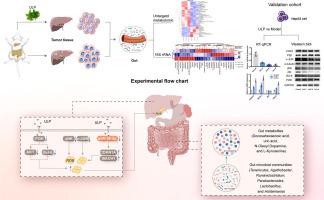Journal of Advanced Research ( IF 11.4 ) Pub Date : 2023-04-17 , DOI: 10.1016/j.jare.2023.04.008 Yinghui Qiu 1 , Jingxiang Xu 2 , Wei Liao 3 , Yuxi Wen 4 , Shiyue Jiang 2 , Jiahui Wen 3 , Chao Zhao 5

|
Introduction
Ulva lactuca polysaccharide (ULP) is green algae extract with numerous biological activities, including anticoagulant, anti-inflammatory, and antiviral effects. However, the inhibitory ability of ULP in the development of hepatocellular carcinoma warrants further studies.
Objectives
To elucidate the anti-tumor mechanism of ULP action and evaluate its regulatory effect on gut microbiota and metabolism in H22 hepatocellular carcinoma tumor-bearing mice.
Methods
An H22 tumor-bearing mouse model was established by subcutaneously injecting H22 hepatoma cells. The gut microbiota composition in cecal feces was assessed and subjected to untargeted metabolomic sequencing. The antitumor activity of ULP was verified further by western blot, RT-qPCR, and reactive oxygen species (ROS) assays.
Results
Administration of ULP alleviated tumor growth by modulating the compositions of the gut microbial communities (Tenericutes, Agathobacter, Ruminiclostridium, Parabacteroides, Lactobacillus, and Holdemania) and metabolites (docosahexaenoic acid, uric acid, N-Oleoyl Dopamine, and L-Kynurenine). Mechanistically, ULP promoted ROS production by inhibiting the protein levels of JNK, c-JUN, PI3K, Akt, and Bcl-6, thereby delaying the growth of HepG2 cells.
Conclusion
ULP attenuates tumor growth in H22 tumor-bearing mice by modulating gut microbial composition and metabolism. ULP inhibits tumor growth mainly by promoting ROS generation.
中文翻译:

石莼通过肠道微生物群和代谢物相互作用抑制肝细胞癌
介绍
石莼多糖 (ULP) 是绿藻提取物,具有多种生物活性,包括抗凝血、抗炎和抗病毒作用。然而,ULP在肝细胞癌发展中的抑制能力值得进一步研究。
目标
目的 阐明 ULP 的抗肿瘤机制,并评估其对 H22 肝细胞癌荷瘤小鼠肠道菌群和代谢的调节作用。
方法
通过皮下注射H22肝癌细胞建立H22荷瘤小鼠模型。评估盲肠粪便中的肠道微生物群组成并进行非靶向代谢组测序。ULP 的抗肿瘤活性通过蛋白质印迹、RT-qPCR 和活性氧 (ROS) 测定进一步验证。
结果
ULP 的施用通过调节肠道微生物群落(特内里卡特斯、无花杆菌、瘤胃梭菌、副杆菌、乳酸菌和霍尔德曼菌)和代谢物(二十二碳六烯酸、尿酸、N-油酰多巴胺和 L-犬尿氨酸)的组成来减轻肿瘤生长。从机制上讲,ULP通过抑制JNK、c-JUN、PI3K、Akt和Bcl-6的蛋白水平来促进ROS的产生,从而延缓HepG2细胞的生长。
结论
ULP 通过调节肠道微生物组成和代谢来减弱 H22 荷瘤小鼠的肿瘤生长。ULP主要通过促进ROS生成来抑制肿瘤生长。










































 京公网安备 11010802027423号
京公网安备 11010802027423号